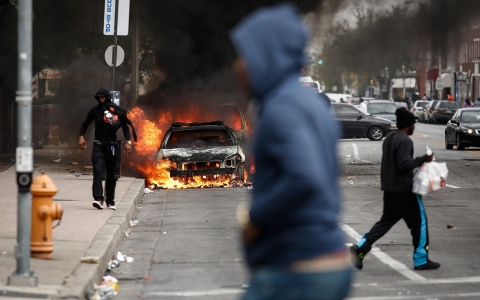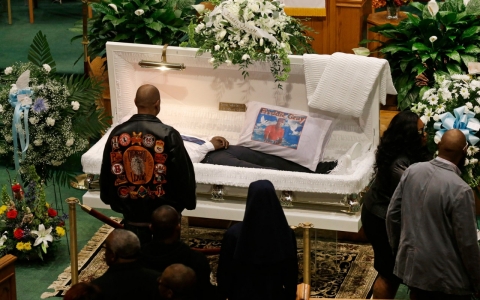Baltimore awoke to a state of emergency and major cleanup operation Tuesday after a night of violence and arson that erupted hours after the funeral of Freddie Gray, a black man who died April 19 after suffering a spinal injury in police custody.
As morning broke, acrid smoke hung over streets where fire crews had raced to contain flames that broke out during violence just blocks from the church where hundreds of mourners paid respects to Gray, 25.
Unrest spread through much of the poor West Baltimore neighborhood. Fifteen buildings and 144 vehicles were set on fire, and nearly 200 people were arrested, according to the mayor's office.
Police said at least 20 officers were injured, one seriously, during confrontations that followed days of bubbling anger.
Baltimore Police Capt. Eric Kowalczyk said during a press conference Tuesday afternoon that a fresh protest was beginning to take shape at the intersection of North and Pennsylvania Avenues, but that it appeared non-violent.
“That crowd is peaceful, and that is what we are used to in Baltimore,” he said.
When asked why more police presence or assistance did not arrive sooner to quell the violence, Kowalczyk reminded reporters that when the police department deployed officers on Monday, it had sent them to a high school event.
“I don’t think there’s anyone who would expect us to deploy automatic weapons and armored vehicles for an event with 14-, 15- and 16-year-olds,” he said.
He also said that looters had sought to gain from the chaotic environment. “What we saw last night was a group of people take advantage of a situation, of a very unfortunate situation, and use that to tear down their own neighborhoods.”
President Barack Obama said Tuesday there was "no excuse" for the violence.
"When individuals get crowbars, they are not protesting; they are stealing,” Obama said.
But he added there have been too many troubling police interactions with black citizens, describing the deaths of several black men by officers "a slow rolling crisis."
With a state of emergency in place, National Guard troops fanned out across Baltimore on Tuesday, adding to the presence of police with riot shields blocking off certain streets. Meanwhile, firefighters doused smoldering blazes after looting and arson that occurred during the night.
It was the first time the National Guard was called in to quell unrest in Baltimore since 1968, when people in some of the same neighborhoods poured into the streets after the assassination of the Rev. Martin Luther King Jr.
During Monday’s violence, looters ransacked stores, pharmacies and a shopping mall and clashed with police in riot gear in the most violent unrest in the United States since Ferguson, Missouri, was torn by gunshots and arson in late 2014 after the fatal police shooting of unarmed black teenager Michael Brown.
Monday’s violence started in the afternoon in West Baltimore — within a mile of where Gray was arrested and placed in a police van on April 12 — and by midnight had spread to East Baltimore and neighborhoods close to downtown and near the city’s baseball stadium.
Gray's death from a severe spinal injury — sustained while being arrested or while in police custody — gave new energy to the public outcry that flared last year after police killings of unarmed black men in Ferguson, New York City and elsewhere.
Authorities said they are still investigating how and when Gray suffered the injury. Authorities say he was driven in the police van without being belted in — a violation of department policy. Six officers have been suspended with pay while the investigation continues.
On Tuesday, volunteers in Baltimore swept up charred debris in front of a CVS pharmacy as dozens of police officers in riot gear stood by and firefighters worked to put out the embers.
"I'm just here to help out," Shaun Boyd, 30, told Reuters as he swept up broken glass. "It's the city I'm from."
The violence appeared to catch city officials and community leaders off guard after a week of mostly peaceful protests after Gray's death.
Maryland Gov. Larry Hogan, a Republican, declared a state of emergency as protests turned violent Monday and imposed a one-week curfew in the city starting Tuesday night, with exceptions for work and medical emergencies.
All public schools and some private ones were closed Tuesday in Baltimore, a largely black city of 620,000 people 40 miles from the nation's capital.
State and local authorities pledged to restore order and found themselves responding to questions about whether their initial response was adequate.
Hogan said Tuesday afternoon that an additional 1,000 National Guard members, police from nearby New Jersey and thousands of volunteers from the governor's office would be brought in to help keep order that night.
"We’re not going to have another repeat of what happened last night," he said. "It’s not going to happen tonight."
After praising what he said was the "instantaneous" response of the state's emergency command center, Hogan urged residents that violence was not the answer.
"The people who have legitimate concerns and frustrations about the ongoing investigation with respect to what happened to Freddie Gray are not served well by violence acts," he said. "This violence isn’t accomplishing anything. It’s counterproductive. We’re going to make sure that we get Baltimore back on track."
Hogan told reporters that on Monday afternoon he called Baltimore Mayor Stephanie Rawlings-Blake "multiple times" from 3 p.m., when the violence started, to 6 p.m., when the emergency response was dispatched.
She has been criticized for waiting hours to ask the governor to declare a state of emergency — including thinly veiled criticism from Hogan.
"We were all in the command center in the second floor of the State House in constant communication, and we were trying to get in touch with the mayor for quite some time," he said at a Monday evening news conference. "She finally made that call, and we immediately took action."
Asked if Rawlings-Blake should have called for help sooner, Hogan replied that he didn't want to question what Baltimore officials were doing. "They're all under tremendous stress. We're all on one team," he said. In an interview with CNN Monday night, he said he would temporarily move his office from Annapolis to Baltimore.
Rawlings-Blake said officials thought they had gotten the unrest under control. "I think it would have been inappropriate to bring in the National Guard when we had it under control," she said.
People set police cars and buildings on fire, looted a mall and liquor stores and threw rocks, bottles and bricks at police in riot gear. Police responded with pepper spray.
"They just outnumbered us and outflanked us," Baltimore Police Commissioner Anthony Batts said. "We needed to have more resources out there."
While members of Gray’s family are angry about what happened to him, they said violence is not the answer. "I think the violence is wrong," his twin sister, Fredericka Gray, told The Associated Press late Monday. "I don't like it at all."
The attorney for Gray's family, Billy Murphy, said the family hoped to organize a peace march later in the week.
Al Jazeera and wire services

Anger over the death of black man while in police custody triggers clashes with police

Maryland is the latest state to deploy its National Guard to quell civil disturbances

Though the media play up violence of protesters, it pales in comparison with police conduct

Thousands are expected to attend services for Baltimore man who suffered serious spinal injuries after arrest






Error
Sorry, your comment was not saved due to a technical problem. Please try again later or using a different browser.